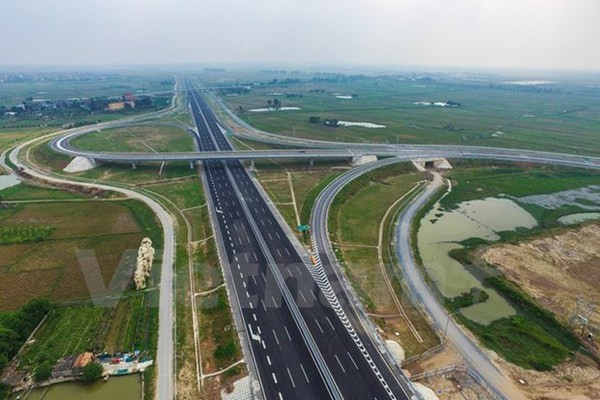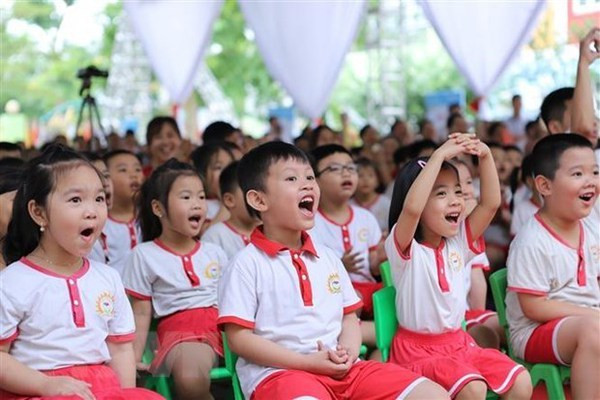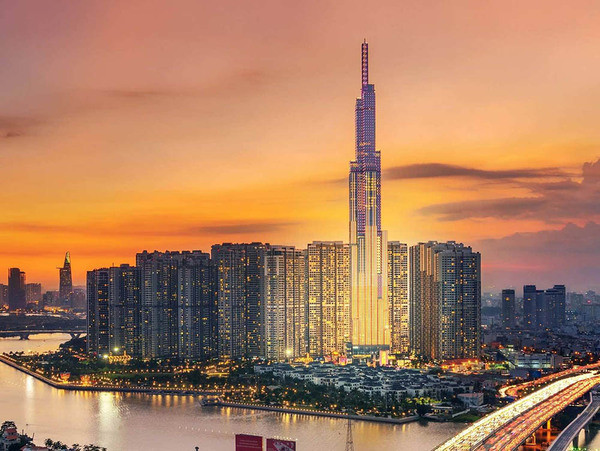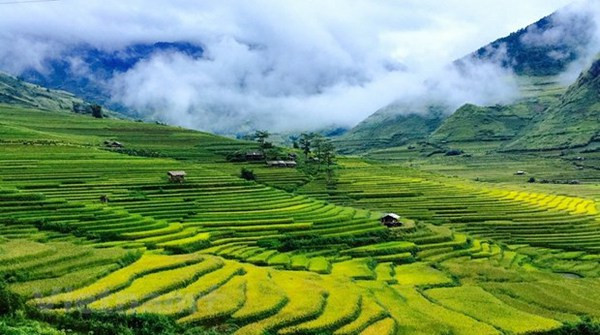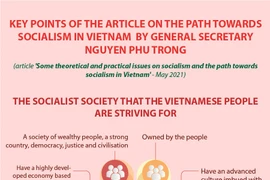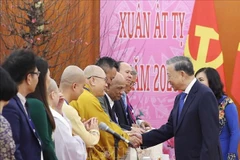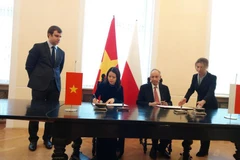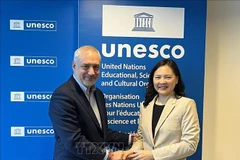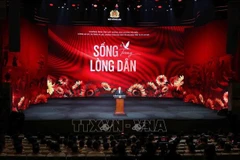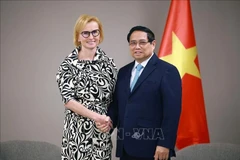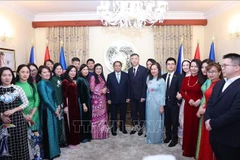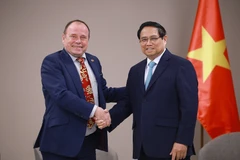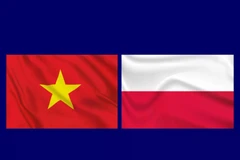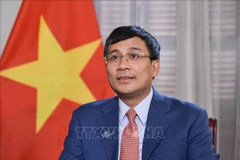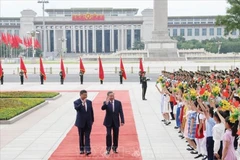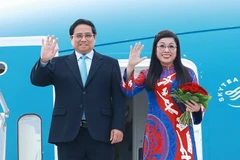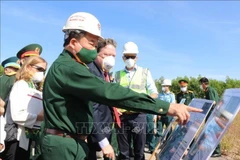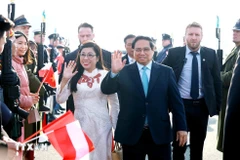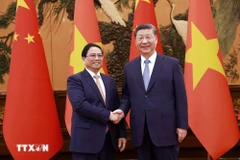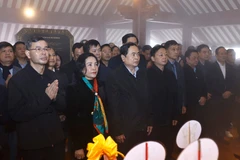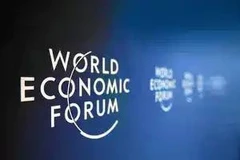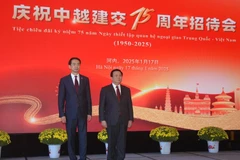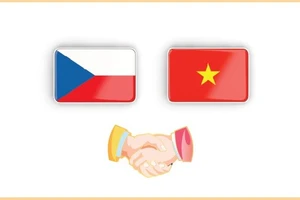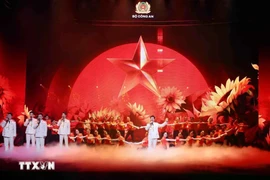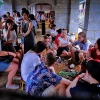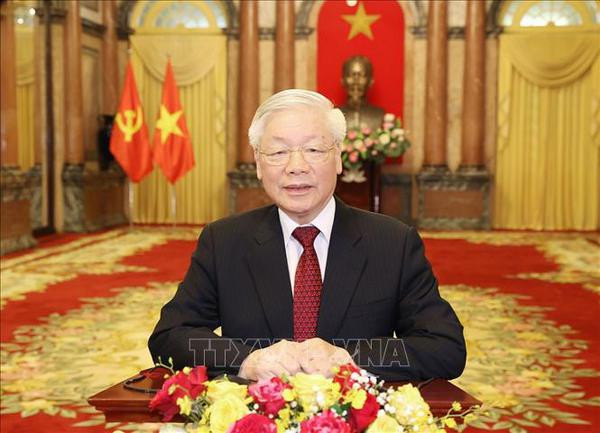 Professor, Dr Nguyen Phu Trong, General Secretary of the Central Committee of the Communist Party of Viet Nam (Photo: VNA)
Professor, Dr Nguyen Phu Trong, General Secretary of the Central Committee of the Communist Party of Viet Nam (Photo: VNA) Hanoi (VNA) -On the occasion of the 131st birthday of President Ho Chi Minh (May 19) and the elections of deputies to the 15th National Assembly and all-level People's Councils 2021-2026 (May 23), Professor, Dr Nguyen Phu Trong, General Secretary of the Central Committee of the Communist Party of Viet Nam (CPV), has written an article titled “A number of theoretical and practical issues on socialism and the path towards socialism in Viet Nam.” Below is the full text of the article:
Socialism and the path to socialism in Viet Nam is a truly fundamental theoretical and practical topic of great importance. It covers a broad array of diverse and complex issues under various approaches, and requires both painstaking and serious investigation, and a deep and scientific stocktaking of practice. Within the scope of this writing, I would like to touch upon some aspects from Viet Nam's practical perspective. I would only focus on answering the following questions: What is socialism? Why did Viet Nam choose the socialist path? How to gradually build socialism in Viet Nam? How significant have the “Doi Moi” (Renewal) and the building of socialism been in Viet Nam over the past years? And what are the issues facing this process?
As we are well aware that socialism is usually understood in three aspects: socialism as a doctrine, socialism as a movement, and socialism as a polity. Each aspect has different manifestations, depending on the world outlook and development level in a specific historical period. The socialism as referred to in this writing is a scientific socialism, based on Marxism - Leninism in the world today. How, then, shall we define socialism and chart the course towards socialism, in a manner suitable to the particular condition and characteristics in Viet Nam?
Previously, while the Soviet Union and its constellation of socialist countries existed in the world, the question of advancing towards socialism in Viet Nam seemed beyond doubt and implicitly validated. However, after the collapse of the socialist model in the Soviet Union and many other Eastern European countries and the decline of the world revolution, the advancement towards socialism was once again put into question and became the topic for every discussion, even drawing heated debate.
Anti-communism and political opportunists rejoiced, and seized that opportunity to spread misinformation and subvert the movement. Within the revolutionary rank, there are also those who wallowed in pessimism and faltered. Some began to doubt the correctness and science of socialism, and blamed the dissolution of the Soviet Union on the errors of Marxism-Leninism and the choice of socialism as the way forward.
From this premise, they believe we have chosen the wrong way and must march on another path. Some echoed the hostile arguments, disparaged and criticized socialism, and indulged in one-sided praise of capitalism. Some even claimed “repentance” for having had faith in Marxism-Leninism and socialism. But is this the truth? Is it true that capitalism today, including those long-standing capitalist countries, are still growing well? Has Viet Nam chosen the wrong way?
We concur that capitalism has never been more global as it is today, and has achieved immense accomplishments, especially in liberating and developing the productive capacity and advancing science and technology. Many developed capitalist countries, building on their advanced economic foundation and also thanks to the struggle of the working class and working people, have made adjustments and set up considerable social welfare schemes that are more progressive than before. Since the mid-1970s, and particularly after the dissolution of the Soviet Union, international capitalism spared no effort to adjust itself and promoted neo-liberalism at the global scale in order to adapt to new conditions. For this reason, it is still able to grow further. Yet capitalism still cannot address its innate and fundamental contradictions. Crises continue to break out. Most notably, in 2008 and 2009 we witnessed a financial crisis and economic recession starting in the United States. It then rapidly spread to other centers of capitalism and affected nearly every country in the world. Capitalist states and governments in the West injected huge amounts of money into their system to save transnational corporations, industrial, financial and banking complexes, and security markets, but they only gained limited success. And today we witness a multi-faceted health, social, political and economic crisis unfolding under the impacts of the COVID-19 pandemic and the Fourth Industrial Revolution. An economy in recession has unmasked social injustice within capitalist societies. The living standard of the majority of working people is falling dramatically while unemployment rises. The rich-poor gap grows larger, exacerbating antagonism and conflict among ethnicities. Instances of “bad development” and “anti-development” paradoxes have spilled over from the economic and financial domain into social life, igniting social conflicts. In many places, economic incidents became political ones, where waves of demonstrations and strikes would shake the entire regime. Reality has shown us that the “free market” of capitalism itself cannot help solve these problems, and in many cases even causes serious harm to poor countries and deepens the conflict between global labor and global capital. This reality also rips apart economic theories or development models that have long been considered as “in vogue”. They were praised by bourgeois politicians and viewed as “optimal” and “sensible” by bourgeois experts .
The economic and financial crises are accompanied by the energy and food crises, the exhaustion of natural resources and the degradation of the environment and ecosystem. These are posing monumental challenges to the existence and development of mankind. They are the consequences of a process of economic and social development that crowned profit as its supreme end, that esteemed the possession of wealth and consumption of material as the yardstick of civilization, and that upholds individual interest as the pillar of society. Such are the core characteristics of the capitalist mode of production and consumption. The ongoing crises once again prove the economic, social and ecological unsustainability of capitalism. According to many scientists, the present crises are impossible to be fully resolved within the framework of a capitalist regime.
Recent social protest movements flaring up in many developed capitalist countries have further exposed the truth about the nature of capitalist polities. In fact, democratic institutions in the mold of “freedom and democracy” that the West spares no effort to promote and impose upon the world at large not at all guarantee that power shall truly be of the people, by the people and for the people - what democracy means at its core. This system of power still belongs mainly to the wealthy few and serves the interest of large capitalist cartels. A tiny minority, even just about 1% of the population , possesses the vast majority of wealth and means of production, controls three quarter of financial and knowledge resources and the mainstream mass media, and accordingly dominates the entire society. This is the root cause of the “99% versus 1%” movement in the United States in early 2011, which has since spread like wildfire into other capitalist countries. The claim of “equal rights” detached from “equal opportunities” to exercise these rights led to democracy in name only - emptiness and without substance. In political life, once the power of money dominates, the power of the people shall be overpowered. This is why in developed capitalist countries, “free” and “democratic” elections, as they claim, may change governments, but may not change the ruling power. Behind the multi-party system in fact remains the dictatorship of capitalist cartels.
We need a society in which development is truly for humans, not for exploitation and dehumanization for the sake of profit. We need economic development accompanied by social progress and equality, not an increase in the gap between the rich and the poor or greater social inequity. We need a society of compassion, solidarity and mutual assistance towards progressive and humanistic values, not unfair competition where “the weak are meat, and the strong do eat” to satisfy the selfish interest of a few individuals and cliques. We need sustainable development in harmony with nature to secure a clean living environment for present and future generations, instead of unlimited exploitation and possession of resources, unrestrained consumption and destruction of the environment. And we need a political system where power truly belongs to the people, is enforced by the people and serve the people, not merely in the interest of the wealthy few. Such beautiful ideals are the true values of socialism, aren’t they? And, are they also the goal and the path that President Ho Chi Minh and our Party and people had chosen, the path upon which we persevere, aren’t they?
As we all know, the Vietnamese people have undergone a long, arduous and sacrifice-filled revolutionary struggle against colonialist and imperialist domination and invasion in order to defend the sacred national independence and sovereignty and for the freedom and happiness of our people, in the spirit of “Nothing is more precious than independence and freedom”.
National independence associated with socialism is the fundamental guideline of Viet Nam's revolution and at the same time the quintessence in the theoretical legacy of President Ho Chi Minh. Through his wealth of practical experience, combined with the revolutionary and scientific theories of Marxism-Leninism, Ho Chi Minh came to a profound conclusion that only socialism and communism may fully answer the question of national independence and bring about freedom, wellbeing and happiness to everyone and every nation.
Since its inception and throughout its revolutionary struggle, the Communist Party of Viet Nam has always asserted that socialism is the goal and ideal of the Communist Party and people of Viet Nam, and that advancing towards socialism is an objective demand of and the inevitable course of Vietnamese revolution. In 1930, in its Political Platform, the Communist Party of Viet Nam stated its line of action: to carry out a people’s national democratic revolution under the leadership of the working class and advance towards socialism, bypassing the stage of capitalism. In the late 20th century, while a large part of the socialist realism in the world collapsed, the bloc of socialist states ceased to exist and the socialist movement entered a period of crisis, decline and hardship, the Communist Party of Viet Nam continued to hold that "Our Party and people are determined to build Viet Nam on the path towards socialism on the basis of Marxism- Leninism and Ho Chi Minh thought.” At the 11th National Congress of the Communist Party (January 2011), in the Platform for National construction in the period of transition to socialism (amended and further developed in 2011), once again we affirmed that "Advancing to socialism is the aspiration of our people and the correct choice of the Communist Party of Viet Nam and President Ho Chi Minh, and is in line with the development trajectory of history".
However, “What is socialism, and how shall we advance to socialism?” That is the question we are always pondering, deliberating, investigating and weighing, in order to gradually improve our guideline and viewpoint, and organize for their implementation, so as to both observe the general law and satisfy the particular conditions in Viet Nam.
During the years of Doi Moi, based on the review of praxis and study of theory, the Communist Party of Viet Nam has been gradually reaching a more complete and profound understanding of socialism and the transition into socialism. We have in stages addressed simplistic ideas we held previously, such as homogenizing the end goal of socialism with the task currently at hand, one-sidedly stressing production relations and equal distribution without fully realizing the need to develop the productive force in the transition period, not recognizing the existence of other economic sectors, putting the market economy in the same basket as capitalism, and viewing the rule-of-law state as the same as a bourgeois state, just to name a few.
As of today, while there remain areas for further study, we have established an overarching understanding: The socialist society that the Vietnamese people are making all efforts to build is a society where the people are well-off, the nation is strong and the people are owners, a society characterized by democracy, equality and civilization. It possesses a highly developed economy on the basis of a modern productive force and suitable and progressive production relations. It enjoys an advanced culture imbued with national identity. Its people are entitled to wellbeing, freedom and happiness and are blessed with opportunities for comprehensive development. Ethnic groups in the Vietnamese community are equal, united, respectful and supportive of each other to grow together. It has a rule-of-law socialist state of the people, by the people and for the people under the leadership of the Communist Party. And it maintains friendship and cooperation with all countries in the world
To achieve this goal, we must step up industrialization and modernization in conjunction with the development of a knowledge-based economy. We must also develop a socialist-oriented market economy, build an advanced culture imbued with national identity, boost human resource development, improve the people's living standards, and exercise social progress and equality. We must safeguard national defense and security, public order and security. We must implement the foreign policy of independence, self-reliance, multilateralization and diversification for peace, friendship, cooperation and development, and actively engage in international integration. We must build a socialist democracy, harness the will and power of all-nation unity in combination with the power of our time. We must build the socialist rule-of-law state of the people, by the people and for the people. We must build an untarnished, strong Party and polity in every respect.
The further our Party delves into practical guidance, the more we realize that the transition to socialism is a long-term and immensely challenging and complex task, for it must bring about profound, qualitative changes across all fields of social life. Viet Nam embarked on its journey to socialism from its starting point as an underdeveloped agricultural country, bypassing the stage capitalism and with a very limited productive force. The country was further weakened by decades of wars resulting in severe devastation, and by the constant subversive attempts of hostile forces. These factors have hinder Viet Nam’s path to socialism. As such it unavoidably requires a protracted transition that involves various stages and forms of socio-economic organization, with a struggle between the old and the new. To say that Viet Nam “bypasses the stage of capitalism”, I mean the country bypasses a regime of oppression, inequality and capitalist exploitation, and bypasses harmful practices and political institutions and arrangements unsuitable in a socialist system. It does not mean that we must reject the accomplishments and values of civilization that mankind has achieved throughout the development of capitalism. Naturally, these achievements must be selectively absorbed via the lens of science and development.
The concept of developing a socialist-oriented market economy is a particularly fundamental and creative theoretical breakthrough of our Party. It is an important theoretical achievement gleaned through 35 years of implementing the ‘Doi Moi’, stemming from Viet Nam’s praxis and selective absorption of experiences around the world. Our understanding is that, a socialist-oriented market economy is a modern market economy well integrated with the world. It is an economy that operates fully and cohesively in line with the laws of a market economy. It is regulated by a rule-of-law socialist state under the leadership of the Communist Party of Viet Nam. It upholds a socialist orientation towards the goals of an affluent people, prosperous nation, democratic, equitable and advanced society. It is a new form of market economy in the history of this economic model. It is a mode of economic organization that abides by the laws of the market economy, but is also built on and guided by the principles and nature of socialism. This is reflected in all three aspects, namely ownership, organization and governance, and distribution. This is not a capitalist market economy, and has yet to become a full-fledged socialist market economy (since our country is still undergoing the transition period).
A socialist-oriented market economy encompasses multiple forms of ownership and multiple economic sectors. Economic sectors operating in compliance with the law are important components of the economy. They are equal under the law in the interest of long-term development, cooperation and healthy competition. In this system, the state economy plays a key role; the collective economy is constantly consolidated and developed; the private sector is an important engine of the economy; the FDI sector is encouraged to develop consistently with the socio-economic development strategies and plans. Distribution relations must ensure fairness and create momentum for growth. Distribution is to be conducted primarily based on labor outcomes, economic efficiency, and capital and resource contributions. It should also be implemented via the system of social security and welfare. The state regulates the economy via the law, strategies, plans, policies and material resources so as to provide orientation to, regulate and stimulate socio-economic development.
A fundamental characteristic and important feature of the socialist orientation in the Viet Nam’s market economy is the combination of economics and society,
the coordination of economic and social policies. It also ensures that economic growth would be accompanied by social progress and equality in every stage, every policy, and throughout the development process. This means that we shall not wait until the economy has reached a high level of development to begin exercising social progress and equality. We also shall certainly not “sacrifice” social progress and equality in pursuit of mere economic growth. On the contrary, every economic policy should target the goal of social development, and every social policy should seek to promote economic growth. Encouraging people to enrich themselves legally should go hand in hand with promoting sustainable eradication of hunger and poverty reduction, and taking care of the disadvantaged and those who have rendered great service to the nation. This is a matter of principle to ensure a healthy, sustainable and socialist-oriented development.
We consider culture as a spiritual foundation of the society, an internal strength, an engine for national development and defense. We regard the holistic development of culture in harmony with economic growth, social progress and equality as a fundamental guideline underlying the construction of socialism in Viet Nam. The culture that we are building is one of progress, rich in national identity. It is a culture of unity in diversity, on the basis of progressive and humanistic values. Marxism - Leninism and Ho Chi Minh Thoughts play a primary role in the spiritual life of the society. We seek to build upon and advance the wholesome traditional values of all ethnicities within our country, and learn from the cultural achievements and quintessence of humanity at large. We strive to build an advanced and healthy society for the true interests and dignity of the people that fosters an increasingly higher level of knowledge, morality, physical fitness, lifestyle and aesthetics. We place the people at the heart of our development strategies. Cultural and human development are both the target and the momentum of Doi Moi. Cultivation of education - training and science - technology constitute our top national policy. Environmental protection is an existential issue and a criterion for sustainable development. The building of happy and progressive families produces a concrete foundation for the society, and the upholding of gender equality is the norm for progress and civilization.
A socialist society is one that strives toward progressive and humanistic values, based on the harmony between the common interests of the entire society and legitimate interests of the people. This is qualitatively different from other societies characterized by competition to acquire exclusive interest between individuals and groups. Therefore, it requires and is also able to cultivate social consensus rather than social opposition and antagonism. In a socialist political system, the relationship between the Party, State and people is a relationship between entities unified in their goals and interests. Every Party guideline, every government policy, law and action, aims to serve the interest and happiness of the people. The political model and its overall mode of operation involves the leadership of the Party, the management by the State, and the mastery by the people. Democracy is the nature of the socialist regime. It is both the goal and engine for the construction of socialism. Building a socialist democracy that ensures the real power belongs to the people is an ultimate and long-term mandate of Viet Nam’s revolution. We aim to unceasingly promote democracy and build a law-governed socialist state that is truly of the people, for the people and by the people, on the basis of the alliance between workers, farmers and intellectuals under the leadership of the Communist Party of Viet Nam. The State represents the people’s right to mastery, and organizes the implementation of the Party’s guidelines. There are mechanisms in place to allow the people to exercise their right to direct mastery and democratic representative in all areas of society, and take part in the governance of society. We are aware that a law-governed socialist state, by nature, is different from a rule-of-law capitalist state. Legislative power under a capitalist regime is essentially an instrument to protect and serve the interests of the bourgeois class. By contrast, the rule of law under socialism is a tool to reflect and exercise the people’s right to mastery, to ensure and protect the interests of the majority of the people. Through the enforcement of the law, the State would secure conditions for the people to truly be the subject of political power, and exercise sole state power to address all actions that violate the interests of the Fatherland and the people. We, at the same time, consider the great national unity to be a source of strength and a decisive factor for the lasting victory of Viet Nam’s revolution. Equality and unity among our ethnic groups and religions are constantly promoted.
Being deeply aware of the Communist Party’s leadership is a factor that decides the success of the ‘Doi Moi’ and ensures our country’s development in line with the socialist path, we pay special attention to party building and rectification. This task is critical to the survival of the Party and the socialist system. The Communist Party of Viet Nam is the vanguard of the Vietnamese working class. The founding, existence and development of the Party aim to serve the interest of the working class, the working people, and the entire nation. As the Party takes the helms and leads the nation, it is recognized by the whole people as their vanguard, and is accordingly the vanguard of both the working class and the mass of working people and the entire Vietnamese nation. This is not meant to downplay the class nature of the Party, but rather to reflect a deeper and more complete understanding of this class nature, for the interest of the working class is aligned with that of the mass of working people and the entire nation. Our Party perseveres with Marxism - Leninism and Ho Chi Minh Thoughts as the foundation and lodestar for the revolution, and holds democratic centralism as the fundamental organizing principle. The Party asserts its leadership through its platforms, strategies, and major guidelines and policies. In practice, these are translated into information dissemination, persuasion, mobilization, organization, inspection, oversight. The Party also leads with Party members’ role models and holds the unified leadership of personnel work. As it understands that the risks to the ruling party are corruption, bureaucracy and degradation, particularly in a market economy, the Communist Party of Viet Nam requires regular self-improvement and self-rectification, and deems it necessary to constantly combat opportunism, individualism, corruption, bureaucracy, extravagance and moral degradation within the Party and the entire political system.
The ‘Doi Moi’, including the development of the socialist-oriented market economy, has truly brought about enormous and positive changes to our country over the past 35 years.
Prior to the ‘Doi Moi’ (in 1986), Viet Nam used to be a poor and war-torn country, with devastated human lives, infrastructure, and environment. For instance, to date, millions of people fall victim to grave diseases, and hundreds of thousands of children are born with birth defects and disabilities due to ‘Agent Orange’/dioxin used by the US Army during wartime. According to experts, it would take another 100 years or more for Viet Nam to fully remove the remaining post-war unexploded ordnance (UXOs). After the war, the US and the Western imposed economic sanctions on Viet Nam for nearly 20 years. That period also saw complex developments in the region and the world, to our detriment. There was a severe shortage of food and essential goods, and our people lived in great hardships, with three quarters of the population living under the poverty line.
Thanks to the ‘Doi Moi’, our economy has begun to thrive, enjoying a relatively high growth rate over the course of 35 years at around 7% per year. Our GDP is continually expanding, reaching $342.7 billion in 2020 and becomes the 4th largest economy in ASEAN. Per-capita income has increased seventeen-fold to $3,512 . Viet Nam successfully graduated from low-income status in 2008. From a country faced with constant food shortages, at present, Viet Nam not only is able to ensure food security, but also has become a leading exporter of rice and various other agricultural products in the world. Our industries are flourishing, the shares of industry and services in our GDP are constantly increasing, and today account for 85% of total GDP. Our foreign trade turnover is growing dramatically, exceeding $540 billion in 2020, in which exports reached over $280 billion. Our foreign exchange reserves jumped to $100 billion in 2020. Foreign direct investment is also rapidly expanding, with a total registered capital of nearly $395 billion USD by late 2020. With regard to our economic structure in terms of ownership, the state sector accounts for 27% of Viet Nam’s total GDP, the collective economy for 4%, the household economy for 30%, the domestic private sector for 10%, and the FDI sector for 20%.
Viet Nam today has a population of over 97 million people across 54 brotherly ethnic groups, 60% of whom residing in rural areas. Economic development has delivered the country from the socio-economic crisis of the 1980s and remarkably improved the people’s living standards. The percentage of poor households falls by 1.5% every year on average, from 58% in 1993 to 5.8% in 2016 by the Government poverty standards, and to less than 3% in 2020 according to the multidimensional poverty index (whose standards are higher than previously). Today, more than 60% of communes have met the standards of “new-style” rural areas. Most of them enjoy car roads leading into their neighborhood center, national power line coverage, primary and secondary schools, clinics, and telephone services. While we are yet able to provide free education at all levels for all, Viet Nam have been focusing its efforts on eradicating illiteracy. We realized universal primary education in 2000 and universal secondary education in 2010. The number of university and college students has increased by 17 times over the last 35 years. Currently, 95% of Vietnamese adults are literate. While we have yet to achieve universal health coverage, we are focusing on enhancing preventive healthcare, epidemic prevention and control, and providing support for disadvantaged persons. Many once-prevalent diseases have been successfully curbed. The poor, children under 6, and the elderly are provided with free health insurance coverage. Children malnutrition and infant mortality have been slashed about three fold. Average life expectancy has gone up from 62 years in 1990 to 73.7 years in 2020. Thanks to economic progress, we have also been able to take better care of people with significant contributions to the revolution and Vietnamese Heroic Mothers, and tend to the graves of martyrs who sacrificed themselves for the Fatherland. The cultural life has also been significantly enriched with a diverse and growing range of cultural activities. 70% of the population now have internet access and Viet Nam is among the world’s fastest-developing IT countries. The United Nations has recognized Viet Nam as one of the leading countries in reaching the Millennium Development Goals. In 2019, Viet Nam’s Human Development Index (HDI) value reached 0.704, putting the country in the high human development category. This is a commendable achievement, especially compared to countries at a similar level of development.
Thus, we can say that the implementation of “Doi Moi” has delivered clear, profound and positive transformations in Viet Nam. The economy is booming and the productive force is strengthened. Poverty is rapidly and constantly falling. The people’s living standard is improving and many social issues have been addressed. Political and social stability, defense, and security are well-safeguarded. We enjoy an increasingly broader foreign relations and more extensive international integration. Our national standing and power are growing and the people’s trust in the Party’s leadership is bolstered.
In its review of 20 years of “Doi Moi”, the 10th National Party Congress (2006) noted that the Doi Moi process has garnered “immense historic achievements”. Indeed, in many respects, the Vietnamese people nowadays enjoy living standards higher than ever before. It is one of the reasons why the Doi Moi initiated and led by the Communist Party of Viet Nam receives such support, and is actively implemented by the broad mass of Vietnamese citizenry. The successes of Doi Moi have proved that socialist-oriented development is not only more economically positive, but also capable of better addressing social problems, than is the case in capitalist countries at the same level of economic development. The extraordinary results and accomplishments of Viet Nam amidst the COVID-19 pandemic and global recession since early 2020 have been recognized and commended by international friends and peoples, thus illustrating the superiority of the socialist system in our country. Recently, the 13th National Party Congress once again asserted and emphasized that “After 35 years of Doi Moi, 30 years of implementing the Platform for national development during the transition to socialism, the theories on Doi Moi, socialism, and the path towards socialism in Viet Nam are becoming more complete and gradually translated into reality. We have achieved tremendous and historic progress, and are developing more vigorously and comprehensively compared to the pre-Doi Moi era. With all due modesty, we can say that “Never has our country had such fortune, potential, international standing and prestige as it does today.” Such progress is the crystallization of the creativity of the entire Party, people and army, and the product of our enduring and constant endeavor over the many past terms of office. It is testimony to the correctness of our path to socialism. It proves that this process is well in line with objective laws, the situation in Viet Nam, and the development trajectory of our times. It demonstrates that the Doi Moi guideline set by the Party is correct and innovative. It proves that the leadership of the Party is the foremost element that decides all victories of the revolution in Viet Nam. The political platform of the Party continues to be the ideological banner that strengthens our people’s resolve and leads them along the path of comprehensive and holistic Doi Moi. It serves as the foundation for our Party to improve its guideline for the building and defense of our Fatherland, the Socialist State of Viet Nam, in the new era.” (Documents of the 13th National Party Congress, volume 1, National Political Publishing House, Hanoi, 2021, page 25-26).
Apart from the dominant streak of achievements and positive aspects, there remain considerable drawbacks and limitations, in addition to emerging challenges that we must face in our national development.
Economically, Viet Nam's growth quality and competitiveness remain low and not very sustainable. Infrastructure lacks coherence, and the effectiveness and capability of many businesses, including state-owned enterprises, are limited. The environment in many areas suffers from pollution. The administration and regulation of the market still exhibit many shortcomings. Meanwhile, competition is growing increasingly fiercer against the backdrop of globalization and international integration.
Socially, the wealth gap is on the rise, while the quality of education, healthcare and other public services still leaves much to desire. Our culture and social morality shows signs of decline in certain aspects, and crime and social evils continue to see complex developments. Most alarmingly, corruption, extravagance, degradation in political thought, morality and lifestyle can be observed in a portion of cadres and Party members. At the same time, hostile forces are trying all means to intervene, subvert, cause instability and carry out “peaceful evolution” in order to undermine socialism in Viet Nam.
Our Party recognizes that Viet Nam is in a transitional period towards socialism. During this transition, socialist elements are taking shape, intertwined and competing against non-socialist elements, including capitalist elements in a number of areas.
This overlap and competition become even more complex and intense against the backdrops of the market economy, openness, and international integration. Apart from achievements and positive developments, there will always be negative aspects and challenges that demand rational consideration and prompt and effective resolution. This is an arduous and grueling struggle that requires a new vision, new resolve, and new drive for innovation. Advancing towards socialism is a period of tirelessly bolstering, augmenting and harnessing socialist elements so that they would become more dominant and superior, and ultimately triumph. Success or failure depends, first and foremost, on the correctness of the Party guideline and its political fortitude, leadership, and combativeness.
Presently, we are continuing to accelerate the transformation of our growth model and economic restructuring with greater focus on quality and sustainability. In this connection, we have identified the following breakthroughs: the synchronous improvement of development institutions, with priority given to the socialist-oriented market economy; the development of human resources, particularly highly-skilled workers; and the development of synchronized and modern infrastructure, economically and socially (Documentation of the XIII Congress, volume 2, pp. 337 - 338).
With regards to social development, we continue to promote sustainable poverty reduction, improve the quality of healthcare, education and other public services, and further enhance people’s cultural life. The entire Party, people and army are making every effort to study and emulate President Ho Chi Minh's thoughts, morality and style with the determination to stem and reverse the degeneration in political ideology, morality, and lifestyles among a portion of cadres and Party members, primarily leadership and managerial cadre at all levels. We shall strive to better implement the principles of Party organization and building, in order to ensure the Party organization and the state apparatus will grow stronger and free from taint, maintain the Party's revolutionary nature and improve its leadership capacity and combativeness.
Both theory and praxis have shown that building socialism means creating a qualitatively new type of society, which is by no means a simple or easy task. This is a grand and innovative endeavor, full of challenges and adversities. It is a self-driven, continuous, long-term and goal-oriented cause that cannot be rushed. Therefore, in addition to charting the correct Party line and policy and ensuring its leadership role, we must actively harness people's creativity, support and active participation. The people shall welcome, support and enthusiastically participate in the implementation of the Party lines since they see that such guidelines are in their interest and live up to their aspirations. The ultimate victory and development is deeply rooted in the strength of the Vietnamese people.
On the other hand, the Party’s leadership and stewardship, in shaping the political line and making decisions, should not refer only to the reality of its own country and nation. It must instead also study and learn from the experience of the world and that of the times. In today's globalized world, the development of each nation-state cannot stand alone and separate from the impacts of the world and the times, and those of the context and the dynamics. Therefore, we must actively engage in international integration, implement a foreign policy of independence, self-reliance, peace, cooperation and development, and multilateralization and diversification of international relations, on the basis of respect for the independence, sovereignty and territorial integrity of each other, non-interference in each other's internal affairs, equality and mutual benefit.
And it is of great importance to remain steadfast and firm on the foundation of Marxism - Leninism - the scientific and revolutionary doctrine of the working class and the working people. The scientific and uncompromising revolutionary nature of Marxism-Leninism and Ho Chi Minh’s Thought are enduring values that have been pursued and implemented by generations of revolutionaries. This will continue to develop and prove its vitality in the reality of both the revolutionary movement and scientific development. We need to selectively accept and supplement in the spirit of criticism and creativity of the latest ideological and scientific achievements, so that they shall forever be fresh and revitalized, and filled with the breath of our times, thus not falling prey to dogmatism and obsoleteness./.
